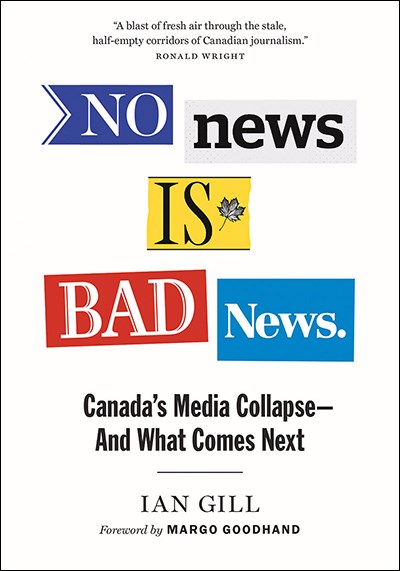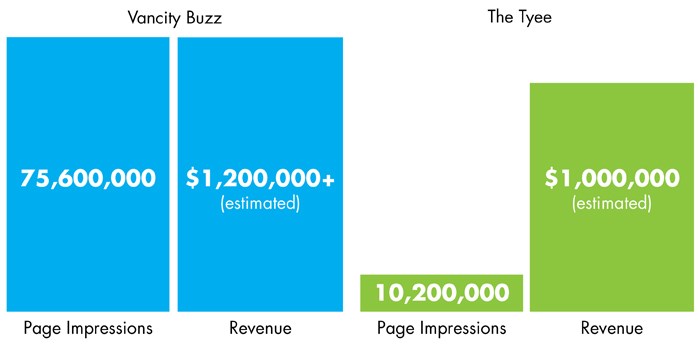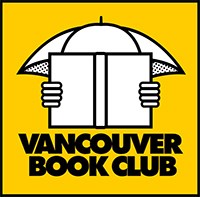Researched while doing a fellowship in 2015, Ian Gill's latest, 'No News is Bad News', takes a close look at the collapse of journalism and the newspaper industry in Canada. I first picked it up in the gift shop on the ferry, flipped through the index and noticed a number of digital media sites were missing from it, and put it back on the shelf; I didn't buy it because I didn't feel it was going to be as broad of a look as I wanted it to be. However as the volume of layoffs and buyouts at Postmedia and other companies picked up recently, I asked the publisher if they might send a review copy. I hoped to get a better understanding of the issue from a historical perspective, and if I have a single piece of praise for this book it's that it really offers a condensed education on legacy media.
It starts off with a zing as Gill takes no prisoners while looking at our traditional media landscape. He refers to the CBC as "an outdated, tone-deaf, ponderous, and slow-witted kind of Canadian Borecasting Corporation". At one point, after quoting Walrus magazine editor Jonathan Kay's insightful take on whether or not the free market can sustain high quality journalism, he goes on to call the publication "a flaccid, self-satisfied kind of poor man's New Yorker". It's entertaining to read someone who used to work as a reporter (20+ years ago) but now has no intention of making friends in an industry tear it to shreds. What's on offer is the author's honest-as-he-can-be look at how journalism in Canada got to the dire position it's in right now.
I regret not buying it initially as I did enjoy it and I learned some things from its 149 pages, but it doesn't offer a silver bullet solution to how journalism will be saved. In fact I don't think it even offers a lead one. The research was done almost two years ago (or a decade ago, if you calculate for the inflation rate of traditional media layoffs and buyouts this year), and while that fact alone may have shook much of the gunpowder from its cartridge it was the author's bias that caused it to miss its mark for me. After hanging up his hat as a journalist Gill worked for years as the president of Ecotrust Canada, an environmental charity. The book is co-published by the David Suzuki Institute, whose intention is to "stimulate debate and action on environmental issues", and he's "pro-advocacy" when it comes to journalism. His work here is painful in its slant, as there's an environmental thread ham-fistedly woven into the narrative. His solutions seem to be focused only around publications with an explicit social or environmental agenda, and in my opinion that doesn't offer an answer that serves all of the citizens of Canada. We need journalism that serves (and interests) everyone.
My takeaway is that he feels grants and subsidies from government and non-profit organizations and charities are the solution. And he walks the walk: 4 government agencies, 1 non-profit and 1 private granting foundation aided financially in getting 'No News is Bad News' into the world. They were the Canada Council for the Arts, the BC Arts Council, the Province of BC through its Book Publishing Tax Credit, the Government of Canada, the David Suzuki Institute and the J.W. McConnell Family Foundation.
Another supporter appears to be The Tyee (though not financially), which I was at first surprised to see spared from the skewering that Gill offered almost every other outlet he touches on. Instead of being critical he flaunts them as an example of what the future of journalism looks like. When I got to the acknowledgements section the first note is that Tyee founder, David Beers, is named as a "close collaborator", and things became clear. I've published a couple of pieces about The Tyee which you can read HERE and HERE. While I do think they do important work, and the future of journalism may very well rely on outlets like theirs, my views don't exactly align with Gill's on them - I feel they have room for improvement.
 Speaking of old research, here’s a comparison graph I made in 2016, back when Daily Hive was Vancity Buzz
Speaking of old research, here’s a comparison graph I made in 2016, back when Daily Hive was Vancity Buzz
I've got some issues with this title however I still think you should buy it. And as a followup I would love to see Gill sit down with the leaders of upstart online properties like Vancouver's Daily Hive, Toronto's BlogTO, Narcity and others, and see what the truly disruptive upstarts have to say about the future of media in Canada because - love them or hate them - they are that future, and the future is now. He doesn't name them explicitly as "clickbait sites" but mentions that such things exist and that they trade in a lower quality of journalism than he has a taste for. By leaving them out of this volume I feel we're left exactly where we were in the beginning: without any real answers.
If I may pull a quote from Mr Gill's book, "That should send a shiver down the spine of whichever journalists are left who still have one".
Learn more about the title at Greystone Books' site HERE, and pick it up at Pulp Fiction, Book Warehouse, on the ferry, or wherever you buy your books.
 Since 2010 V.I.A.'s Vancouver Book Club has been connecting the city with books and authors through a range of online features and offline events. This post is part of our blog series where we're recommending a book we think you should read, every single week. Mostly non-fiction, these titles will give you a greater understanding of the past, present and future of the city, province and country you call home.
Since 2010 V.I.A.'s Vancouver Book Club has been connecting the city with books and authors through a range of online features and offline events. This post is part of our blog series where we're recommending a book we think you should read, every single week. Mostly non-fiction, these titles will give you a greater understanding of the past, present and future of the city, province and country you call home.
More reviews by Bob Kronbauer:
- 'The Killer Whale Who Changed the World' by Mark-Leiren-Young
- 'We Oughta Know' by Andrea Warner
- 'The Last Gang in Town' by Aaron Chapman
- 'The Woods: A Year on Protection Island' by Amber McMillan
- 'The Reading Tree' by Dianna Bonder and the VPL
- 'Secret Life: The Jian Ghomeshi Investigation' by Kevin Donovan


